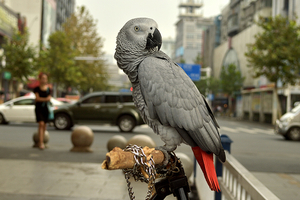In Depth: Ambiguous Reef Protection Laws Leave China’s Coral Sand Traders High and Dry
Listen to the full version

In December 2021, with the Covid-19 pandemic raging around the world, police arrived at a quarantine site in Binzhou, Shandong province, where Wu Xing was interned and abruptly took him away. They brought the small businessman, who has dealt in coral sand for almost a decade, to his company’s warehouse, where Wu was astonished to find the premises surrounded by a dozen police cars.

Download our app to receive breaking news alerts and read the news on the go.
Get our weekly free Must-Read newsletter.
- DIGEST HUB
- Wu Xing, a coral sand trader in Shandong province, was arrested in 2021 for allegedly selling protected wildlife, leading to a trial in March 2024.
- Coral sand, used in aquarium filtration, is disputed in legal classifications: some experts argue it's not wildlife, while authorities claim it’s protected due to coral origins.
- The uncertainty in legal definitions emphasizes the need for clear regulations, impacting traditional business practices and environmental conservation efforts.
In December 2021, during the height of the Covid-19 pandemic, Wu Xing, a small businessman dealing in coral sand, was unexpectedly detained by police at a quarantine site in Binzhou, Shandong province. Taken to his company’s warehouse, Wu discovered authorities had sealed the place and were scrutinizing a recent container shipment of 27.3 tons of coral sand. This material, made from limestone skeletal remains of marine organisms, is used in aquarium filters [para. 1][para. 2].
Wu was shocked to find that coral sand was considered a protected animal, rendering its trade illegal under national laws. He and four others were charged with illegal trade of endangered wildlife and their trial began in March 2024. Similar cases have resulted in severe penalties, exemplified by a man sentenced to two years in prison and a 120,000 yuan ($16,900) fine in 2023 [para. 4][para. 7]. This is a high-stakes issue given the lucrative nature of the aquarium filter market, projected to reach $1.5 billion globally by 2032, with China set to dominate this market due to increasing commercial fish farming activities [para. 8].
Coral reefs play a crucial role in marine environments, providing over $375 billion annually in goods and services and supporting over 500 million people globally. However, whether coral sand should legally be classified as "precious or endangered wild animals" remains contentious. In China, collecting coral sand can disrupt local ecosystems, affecting species such as sea turtles [para. 9][para. 10]. Defense attorney Li Erquan and other environmental advocates argue that coral sand is neither a living creature nor a protected species [para. 10][para. 13].
The classification debate is complicated by differing expert opinions. One key witness for the prosecution was an associate researcher in zoology without published research in corals. Defense experts from the Third Institute of Oceanography and Hainan Academy of Ocean and Fisheries Sciences found the coral sand samples did not meet the criteria for protected species. This dissonance points to inadequacies in legal frameworks governing wildlife protection [para. 20][para. 22].
Wu’s case highlights the interaction between traditional practices and modern legal standards. For decades, coral sand has been used in construction in areas like Hainan and Guangdong provinces, and it is a common practice among fish farmers [para. 36]. These conflicting uses and the ambiguity in laws have prompted scrutiny from governmental bodies. In April 2023, discussions held by the Fisheries and Fishery Administration Bureau leaned toward classifying and managing the use of stony corals based on context and laws, indicating a nuanced approach but lacking clear legal directives [para. 26][para. 27].
Ultimately, the situation underscores a broader issue: the need for clear regulations in wildlife protection laws that can reconcile environmental goals with traditional business practices. Wu's case continues without a verdict, reflecting the ongoing struggle to define and enforce environmental protections in a legally coherent and socially equitable manner [para. 30].
- No specific name provided
- The article discusses Wu Xing, a businessman in China who was detained for trading coral sand, considered protected wildlife. Despite his claims that coral sand is not a living animal, he faces potential legal consequences. The case underscores the ambiguity in Chinese law regarding whether coral sand should be classified as protected wildlife, with conflicting expert evaluations and ongoing legal debates. Wu's trial began in March 2024, with no verdict yet.
- December 2021:
- Wu Xing was taken away by police from a quarantine site in Binzhou, Shandong province, and his company's warehouse was sealed.
- September 2023:
- The Third Institute of Oceanography concluded that the coral sand samples involved in Wu's case did not have the complete skeletal structure of corals and were not subject to regulation under the CITES convention.
- March 20, 2024:
- The trial of Wu and four co-defendants began, with prosecutors charging them with illegally acquiring and selling precious and endangered wildlife.
- Early April 2024:
- The Fisheries and Fishery Administration Bureau of the Ministry of Agriculture and Rural Affairs held a symposium in Beijing to discuss the regulation of stony coral use.
- May 2024:
- Shortly after the trial began, local prosecutors and experts from the First Institute of Oceanography of the Ministry of Natural Resources visited Wu's company to inspect the products involved in the case.
- PODCAST
- MOST POPULAR







 Sign in with Google
Sign in with Google
 Sign in with Facebook
Sign in with Facebook
 Sign in with 财新
Sign in with 财新